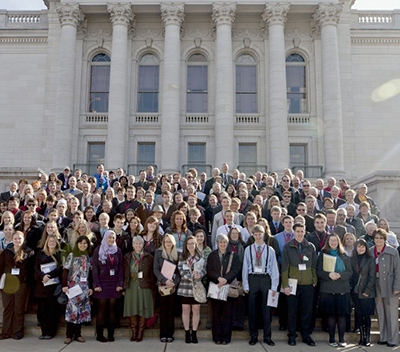 What do we mean by “Youth in Governance?”
What do we mean by “Youth in Governance?”
Youth and adults working together in positions of authority to make decisions and take action to strengthen organizations, communities, and our democratic society.
Why is it important?
In 2002, over 2000 Wisconsin residents came together in 83 county-based conversations on youth development. They identified two top priorities which emphasize public support for the role of youth in building healthy communities and a vital democracy:
- Create a culture in which youth are equal partners in decision making and governance.
- Encourage youth community service and civic involvement.
Benefits
Youth Voice and Representation: Youth have a voice in decisions that affect them.
Community Improvement: As youth become stakeholders and change agents in communities and organizations, they bring perspectives, knowledge and relationships that lead to better decisions and more productive action.
Positive Youth Development: It promotes positive outcomes among youth. It teaches the skills of active citizenship such as understanding how decisions are made and how to organize, plan, and communicate.
Civic Development: Our civil society is strengthened when youth become informed and thoughtful citizens. Young people with skills, knowledge, commitment, and experience can reflect upon the common good, become full members of their communities, and take political action.
Youth on Local Government Boards and Committees
UW-Extension is working with county boards and city councils and their committees to include youth representation in several Wisconsin counties. There are several models of government involvement, including youth with committee voting rights, youth advisors on county board committees, and youth representatives at full board meetings. Read more about youth representation in local government programs across the state–literally from Superior to Kenosha.
Local Government Education
4-H Youth Development offers opportunities for youth to learn about and interact with local government as they participate in community action projects, meet with local stakeholders to represent the program, and join specialized programs such as Columbia County’s Future Leaders Active in Government.
Teen Court
Teen Courts give young offenders the option to work with their peers based on a model of restorative justice. Many active programs are coordinated by UW-Extension; others are hosted by partners, with Extension providing training and support–information and a listing of programs is available from the Wisconsin Courts. More information is available from UW-Extension Youth Development Educator Nancy Anne Miller.
Youth Boards
Youth serve as partners with adults or independently with adult coaching in many community leadership boards. Some are focused on youth philanthropy, including Dane County By Youth For Youth and Kenosha County Youth As Resources. Others engage youth with adults to promote health and education in groups such as the Buffalo County Partnership Council.



